The construction of the International Space Station (ISS) may be considered to have begun in November 1998 when the Zarya module was launched into orbit as it was completed, for most of it, early 2011. Some adds and modifications are still to come. Function of their importance, they will be registered either on that page or on the main page dedicated to the ISS
The following pictures are showing the state of assembly of the ISS (pictures are not clickable; pictures NASA)
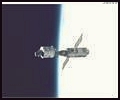 | 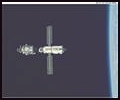 | 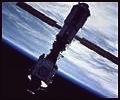 | 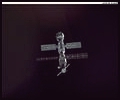 | 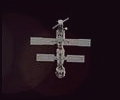 |
| STS-88 (12/4/98) | STS-96 (5/27/99) | STS-101 (5/19/00) | STS-106 (9/8/00) | STS-92 (10/11/00) |
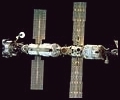 | 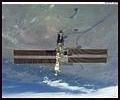 | 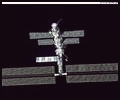 | 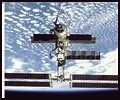 | 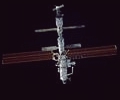 |
| STS-97 (11/30/00) | STS-98 (2/7/01) | STS-102 (3/8/01) | STS-100 (4/19/01) | STS-104 (7/12/01) |
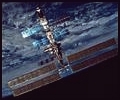 | 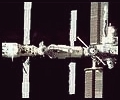 | 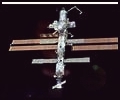 | 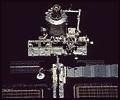 | 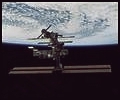 |
| STS-105 (8/10/01) | STS-108 (12/5/01) | STS-110 (4/8/02) | STS-111 (6/5/02) | STS-112 (10/7/02) | 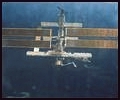 | 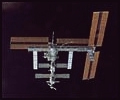 | 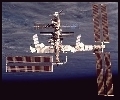 | 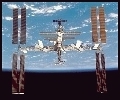 | 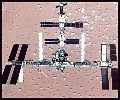 |
| STS-113 (11/23/02) | STS-115 (9/9/06) | STS-116 (12/9/06) | STS-117 (6/10/07) | STS-118 (8/8/07) |
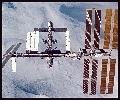 | 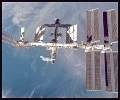 | 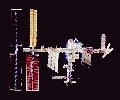 | 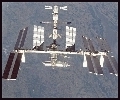 | -no picture available- |
| STS-120 (10/23/07) | STS-122 (2/7/08) | STS-123 (3/11/08) | STS-124 (5/31/08) | STS-126 (11/14/08) |
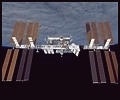 | 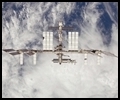 | 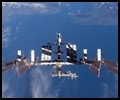 | 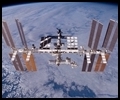 | 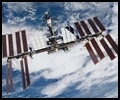 |
| STS-119 (3/15/09) | STS-127 (7/15/09) | STS-128 (8/27/09) | STS-129 (11/16/09) | STS-130 (2/8/10) |
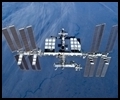 | 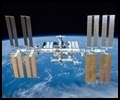 | 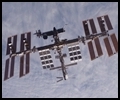 | ||
| STS-131 (4/5/10) | STS-132 (5/14/10) | STS-133 (2/24/11) |
The following table was built from data at NASA. It's showing all the steps of the International Space Station assembly. Assembly flights which were flown by the Space Shuttle are mentioned, as, when useful, precisions are given about the crew which was present aboard the ISS (first crew settlement aboard occurred in October 2000). As far as steps of the construction performed during a Space Shuttle mission, useful details may be found through our Space Shuttle Past Missions archive (note: that archive begins with the STS-114 Space Shuttle mission only)
| Mission's Designation | (Shuttle's Missions) | Mission Beginning Date | (Crew Present Aboard) | Description |
|---|---|---|---|---|
| Mission 1 A/R | - | Nov. 20, 1998 | - | The Zarya Control Module was launched atop a Russian Proton rocket. Zarya provides battery power and fuel storage |
| Mission 2A | STS-88 | Dec. 4, 1998 | - | Space Shuttle Endeavour delivered the Unity Node with two pressurized mating adapters. The STS-88 crew captured Zarya and mated it with the Unity Node |
| Mission 2A.1 | STS-96 | May 27, 1999 | - | Space Shuttle Discovery with the STS-96 crew delivered and outfitted the Station with logistics and supplies |
| Mission 2A.2a | STS-101 | May 19, 2000 | - | The STS-101 crew readied the Station for the arrival of the Zvezda Service Module |
| Mission 1R | - | July 12, 2000 | - | The Zvezda Service Module launched atop a Russian Proton rocket and docked to the Station two weeks later |
| Mission 2A.2b | STS-106 | Sept. 8, 2000 | - | The STS-106 crew delivered supplies and performed maintenance on the Station |
| Mission 3A | STS-92 | Oct. 11, 2000 | - | Arriving aboard Space Shuttle Discovery the STS-92 crew installed the Z1-Truss, a third pressurized mating adapter and a Ku-band antenna |
| Mission 2R | - | Oct. 31, 2000 | Expedition 1 (launch: October 2000; landing: March 2001) | The first crew to live and work aboard the International Space Station arrived in a Soyuz spacecraft |
| Mission 4A | STS-97 | Nov. 30, 2000 | - | The STS-97 crew delivered and installed the P-6 Truss which supports the first U.S. solar arrays |
| Mission 5A | STS-98 | Feb. 7, 2001 | - | The STS-98 crew installed the new Destiny Laboratory Module after removing it from Space Shuttle Atlantis' payload bay |
| Mission 5A.1 | STS-102 | March 8, 2001 | Expedition 2 (launch: March 2001; landing: August 2001) | Space Shuttle Discovery resupplied the Station with cargo from the Italian-built Leonardo Multi-Purpose Logistics Module. The Shuttle also arrived with the Expedition Two crew and returned Expedition One home |
| Mission 6A | STS-100 | April 19, 2001 | - | Space Shuttle Endeavour delivered racks to the Destiny Laboratory with the Raffaello Multi-Purpose Logistics Module.Canadarm 2, the Station's robotic arm, walked off the Shuttle to its new home |
| Mission 7A | STS-104 | July 12, 2001 | - | The STS-104 crew used the Space Shuttle Atlantis' robotic arm to install the new Joint Airlock from which both Russian and American spacewalks may take place |
| Mission 7A.1 | STS-105 | Aug. 10, 2001 | Expedition 3 (launch: August 2001; landing: December 2001) | Space Shuttle Discovery transferred Station crews bringing Expedition Three to their new home and taking home Expedition Two |
| Mission 4R | - | Sept. 14, 2001 | - | A Russian Soyuz rocket delivered a cargo crane and the Russian Pirs Docking Compartment for both a Soyuz docking port and Russian-based spacewalks |
| Mission UF-1 | STS-108 | Dec. 5, 2001 | Expedition 4 (launch: December 2001; landing: June 2002) | Space Shuttle Endeavour delivered experiment racks inside the Multi-Purpose Logistics Module that were installed in the Destiny Laboratory |
| Mission 8A | STS-110 | April 8, 2002 | - | Space Shuttle Atlantis delivered the S0-Truss and the Mobile Transporter, which the STS-110 crew installed. The Mobile Transporter gives extra mobility to the Canadarm2 |
| Mission UF-2 | STS-111 | June 5, 2002 | Expedition 5 (launch: June 2002; landing: December 2002) | Space Shuttle Endeavour, with a Multi-Purpose Logistics Module, delivered more payload and experiment racks to the Destiny Laboratory. The Mobile Base System was also installed completing the Station's Mobile Servicing System |
| Mission 9A | STS-112 | Oct. 7, 2002 | - | Space Shuttle Atlantis delivered the first starboard truss segment, the S1 Truss, which the STS-112 crew installed |
| Mission 11A | STS-113 | Nov. 23, 2002 | Expedition 6 (launch: November 2002; landing: May 2003) | Space Shuttle Endeavour delivered the first port truss segment, the P1 Truss, which the STS-113 crew installed. The P6 solar arrays were deployed and its batteries were activated |
| Due to the loss of shuttle Columbia in Feb. 2003, any assembly work came to a halt, with crews of two performing maintenance mainly at the ISS. The crew ferried way up and down via Soyuz craft. This was from Expedition 7 (launch: April 2003; landing: October 2003) to Expedition 13 (launch: March 2006) | ||||
| Mission 12A | STS-115 | September 9th, 2006 | Expedition 13 (launch: March 2006; landing: September 2006) | It's that mission which resumed the construction of the ISS after the lull due to the loss of Shuttle Columbia. The STS-115 Space Shuttle mission brought to the Station the P3/P4 truss along with its solar arrays, doubling the power available to the outpost. Present aboard was Expedition 13 |
| Mission 12A.1 | STS-116 | December 9th, 2006 | Expedition 14 (launch: September 2006; landing: April 2006) | The STS-116 mission brought to the ISS the P5 truss segment, as three spacewalks led to a re-organization of the solar arrays at the outpost and its re-wiring unto its permanent power sources |
| Mission 13A | STS-117 | June 10th, 2007 | Expedition 15 (launch: April 2007; landing: na) | The STS-117 mission brought to the ISS the S3/S4 truss segment, as more spacewalks led to a new re-organization of the solar arrays at the outpost |
| Mission 13A.1 | STS-118 | August 8th, 2007 | Expedition 15 (launch: April 2007; landing: October 2007) | The STS-118 mission brought to the ISS, among others, the S5 truss segment and a new external stowage platform-3 (ESP-3) |
| Mission 10A | STS-120 | October 23rd, 2007 | Expedition 16 (launch: October 2007; landing: na) | The STS-120 mission brought to the ISS the new Italian-built, U.S. Harmony module and it re-located to its permanent location the P6 truss with its solar arrays |
| Mission 1E | STS-122 | February 7th, 2008 | Expedition 16 (launch: October 2007; landing: na) | The STS-122 mission brought to the ISS the ESA-built Columbus module and settled it on the side of the previously installed Harmony module |
| Mission 1J/A | STS-123 | March 11th, 2008 | Expedition 16 (launch: October 2007; ending in: October 2008) | The STS-122 mission brought to the ISS the pressurized section of the Kibo Japanese Experiment Logistics Module and the new Canadian Dextre robotics system |
| Mission ULF2 | STS-126 | November 14th, 2008 | Expedition 18 (beginning in: October 2008; ending in: April 2009) | The STS-126 mission brought to the ISS varied cargo aboard a Multi-Purpose Logistics Module, bringing the capacity of the station up to a 6-person crew |
| Mission 15A | STS-119 | March 15th, 2009 | Expedition 18 (beginning in: October 2008; ending in: April 2009) | The STS-119 added to the ISS the last set of its solar arrays, bringing the Space Station to the overall aspect it will get once eventually completed |
| na | STS-127 | July 15th, 2009 | Expedition 20 (beginning in: May 2009; ending in: October 2009) | The STS-127 delivered the the final components of the Japan Aerospace Exploration Agency's Kibo laboratory ('Kibo' means 'hope' in Japanese). A total of 13 astronauts were onboard during the mission of the Space Shuttle, a first ever in the presence of manned history in the Earth's orbit |
| na | STS-128 | August 27th, 2009 | Expedition 20 (beginning in: May 2009; ending in: October 2009) | The STS-128 mission brought supplies and spare parts to the ISS, and installed a fresh tank of ammonia coolant, new antennas and cabling for a next living quarter to come by the station by the beginning of 2010 |
| na | STS-129 | November 16th, 2009 | Expedition 20 (beginning in: May 2009; ending in: October 2009) | The STS-129 mission brought varied components and large spare parts to the ISS, for a total of 30,000 pounds (13,600 kg) in a plan to have the ISS keeping running long once the orbiters' resupply missions will come to a end with the Space Shuttle retirement planned in late 2010. The mission too installed a new oxygen tank to power the airlock used for spacewalking |
| na | STS-130 | February 8th, 2010 | Expedition 22 (beginning in: November 2009; ending in: May 2010) | The Space Shuttle STS-130 mission installed at the ISS the Tranquility module, left of the Unity module as the 7-windowed Cupola was installed on Tranquility, a windowed space which will serve like a recreational area for the ISS crews or to monitor spacewalks and docking operations. Both Tranquility and Cupola were European ESA contributions and built in Torino, Italy, by Thales Alenia Space |
| na | STS-131 | April 5th, 2010 | Expedition 23 (beginning in: March 2010; ending in: May 2010) | The STS-131 Space Shuttle mission installed a ammonia backup tank. The tank is now considered a backup one for the orbital outpost. The old tank has been secured into the space shuttle's payload bay for return to Earth to be filled back with ammonia and flewn again to the ISS as NASA is trying to stockpile as many large spare parts than possible due to the impossibility then to have its own crew or cargo vehicles and as European, Russian or Japanese cargo ships have a lower payload capacity. The STS-131 mission too brought cargo in a Leonardo module which returned ISS trash and discarded items back Earth |
| na | STS-132 | May 14th, 2010 | Expedition 24 (beginning in: May 2010; ending in: September 2010) | The Space Shuttle STS-132 mission installed a backup antenna at the ISS, installed the Russian Mini Research Module-1 (MRM-1) to the Russian Zarya module as they replaced too 6 batteries. By the end of that flight, the ISS now was about complete in terms of living and working space, and huge to explore |
| na | STS-133 | February 24th, 2011 | Expedition 26 (beginning in: December 2010; ending in: March 2011) | The STS-133 mission delivered to the International Space Station the Permanent Multipurpose Module (PMM), which is the multi-purpose logistics module (MPLM) Leonardo converted, providing additional storage for the station crew and placed underside of the ISS Unity node. The mission also carried critical spare components and the Express Logistics Carrier 4 (ELC4), a external platform holding large equipment. Robonaut 2, or R2, also was delivered, the first human-like robot in space, to become a permanent resident of the ISS. Mission crew also added two extensions to the stationís mobile transporter track allowing the transporter to travel the entire track length and reach all of the worksites |